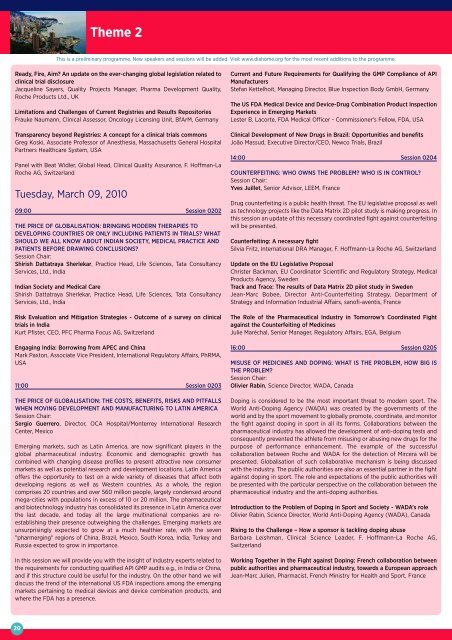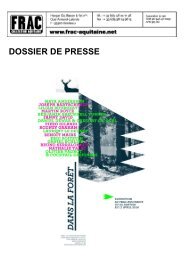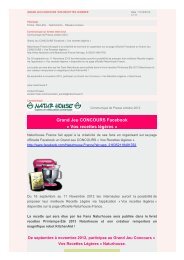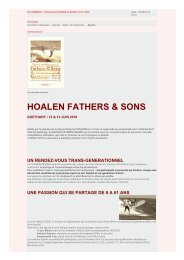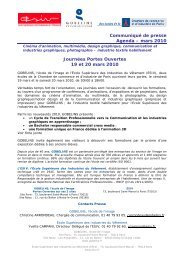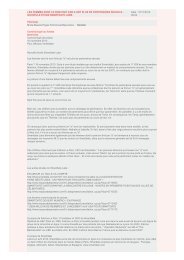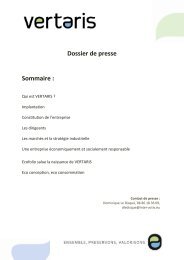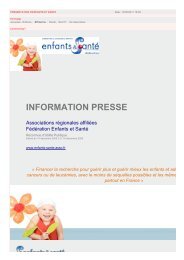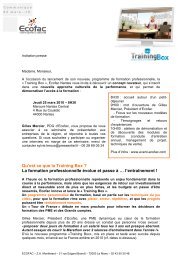Pre-Conference Tutorials, Monday, March 8, 2010, 09:00
Pre-Conference Tutorials, Monday, March 8, 2010, 09:00
Pre-Conference Tutorials, Monday, March 8, 2010, 09:00
You also want an ePaper? Increase the reach of your titles
YUMPU automatically turns print PDFs into web optimized ePapers that Google loves.
20<br />
Theme 2<br />
This is a preliminary programme. New speakers and sessions will be added. Visit www.diahome.org for the most recent additions to the programme.<br />
Ready, Fire, Aim? An update on the ever-changing global legislation related to<br />
clinical trial disclosure<br />
Jacqueline Sayers, Quality Projects Manager, Pharma Development Quality,<br />
Roche Products Ltd., UK<br />
Limitations and Challenges of Current Registries and Results Repositories<br />
Frauke Naumann, Clinical Assessor, Oncology Licensing Unit, BfArM, Germany<br />
Transparency beyond Registries: A concept for a clinical trials commons<br />
Greg Koski, Associate Professor of Anesthesia, Massachusetts General Hospital<br />
Partners Healthcare System, USA<br />
Panel with Beat Widler, Global Head, Clinical Quality Assurance, F. Hoffman-La<br />
Roche AG, Switzerland<br />
Tuesday, <strong>March</strong> <strong>09</strong>, <strong>2010</strong><br />
<strong>09</strong>:<strong>00</strong> Session 0202<br />
THE PRICE OF GLOBALISATION: BRINGING MODERN THERAPIES TO<br />
DEVELOPING COUNTRIES OR ONLY INCLUDING PATIENTS IN TRIALS? WHAT<br />
SHOULD WE ALL KNOW ABOUT INDIAN SOCIETY, MEDICAL PRACTICE AND<br />
PATIENTS BEFORE DRAWING CONCLUSIONS?<br />
Session Chair:<br />
Shirish Dattatraya Sherlekar, Practice Head, Life Sciences, Tata Consultancy<br />
Services, Ltd., India<br />
Indian Society and Medical Care<br />
Shirish Dattatraya Sherlekar, Practice Head, Life Sciences, Tata Consultancy<br />
Services, Ltd., India<br />
Risk Evaluation and Mitigation Strategies - Outcome of a survey on clinical<br />
trials in India<br />
Kurt Pfister, CEO, PFC Pharma Focus AG, Switzerland<br />
Engaging India: Borrowing from APEC and China<br />
Mark Paxton, Associate Vice <strong>Pre</strong>sident, International Regulatory Affairs, PhRMA,<br />
USA<br />
11:<strong>00</strong> Session 0203<br />
THE PRICE OF GLOBALISATION: THE COSTS, BENEFITS, RISKS AND PITFALLS<br />
WHEN MOVING DEVELOPMENT AND MANUFACTURING TO LATIN AMERICA<br />
Session Chair:<br />
Sergio Guerrero, Director, OCA Hospital/Monterrey International Research<br />
Center, Mexico<br />
Emerging markets, such as Latin America, are now significant players in the<br />
global pharmaceutical industry. Economic and demographic growth has<br />
combined with changing disease profiles to present attractive new consumer<br />
markets as well as potential research and development locations. Latin America<br />
offers the opportunity to test on a wide variety of diseases that affect both<br />
developing regions as well as Western countries. As a whole, the region<br />
comprises 20 countries and over 560 million people, largely condensed around<br />
mega-cities with populations in excess of 10 or 20 million. The pharmaceutical<br />
and biotechnology industry has consolidated its presence in Latin America over<br />
the last decade, and today all the large multinational companies are reestablishing<br />
their presence outweighing the challenges. Emerging markets are<br />
unsurprisingly expected to grow at a much healthier rate, with the seven<br />
"pharmerging" regions of China, Brazil, Mexico, South Korea, India, Turkey and<br />
Russia expected to grow in importance.<br />
In this session we will provide you with the insight of industry experts related to<br />
the requirements for conducting qualified API GMP audits e.g., in India or China,<br />
and if this structure could be useful for the industry. On the other hand we will<br />
discuss the trend of the international US FDA inspections among the emerging<br />
markets pertaining to medical devices and device combination products, and<br />
where the FDA has a presence.<br />
Current and Future Requirements for Qualifying the GMP Compliance of API<br />
Manufacturers<br />
Stefan Kettelhoit, Managing Director, Blue Inspection Body GmbH, Germany<br />
The US FDA Medical Device and Device-Drug Combination Product Inspection<br />
Experience in Emerging Markets<br />
Lester B. Lacorte, FDA Medical Officer - Commissioner's Fellow, FDA, USA<br />
Clinical Development of New Drugs in Brazil: Opportunities and benefits<br />
João Massud, Executive Director/CEO, Newco Trials, Brazil<br />
14:<strong>00</strong> Session 0204<br />
COUNTERFEITING: WHO OWNS THE PROBLEM? WHO IS IN CONTROL?<br />
Session Chair:<br />
Yves Juillet, Senior Advisor, LEEM, France<br />
Drug counterfeiting is a public health threat. The EU legislative proposal as well<br />
as technology projects like the Data Matrix 2D pilot study is making progress. In<br />
this session an update of this necessary coordinated fight against counterfeiting<br />
will be presented.<br />
Counterfeiting: A necessary fight<br />
Silvia Fritz, International DRA Manager, F. Hoffmann-La Roche AG, Switzerland<br />
Update on the EU Legislative Proposal<br />
Christer Backman, EU Coordinator Scientific and Regulatory Strategy, Medical<br />
Products Agency, Sweden<br />
Track and Trace: The results of Data Matrix 2D pilot study in Sweden<br />
Jean-Marc Bobee, Director Anti-Counterfeiting Strategy, Department of<br />
Strategy and Information Industrial Affairs, sanofi-aventis, France<br />
The Role of the Pharmaceutical Industry in Tomorrow’s Coordinated Fight<br />
against the Counterfeiting of Medicines<br />
Julie Maréchal, Senior Manager, Regulatory Affairs, EGA, Belgium<br />
16:<strong>00</strong> Session 0205<br />
MISUSE OF MEDICINES AND DOPING: WHAT IS THE PROBLEM, HOW BIG IS<br />
THE PROBLEM?<br />
Session Chair:<br />
Olivier Rabin, Science Director, WADA, Canada<br />
Doping is considered to be the most important threat to modern sport. The<br />
World Anti-Doping Agency (WADA) was created by the governments of the<br />
world and by the sport movement to globally promote, coordinate, and monitor<br />
the fight against doping in sport in all its forms. Collaborations between the<br />
pharmaceutical industry has allowed the development of anti-doping tests and<br />
consequently prevented the athlete from misusing or abusing new drugs for the<br />
purpose of performance enhancement. The example of the successful<br />
collaboration between Roche and WADA for the detection of Mircera will be<br />
presented. Globalisation of such collaborative mechanism is being discussed<br />
with the industry. The public authorities are also an essential partner in the fight<br />
against doping in sport. The role and expectations of the public authorities will<br />
be presented with the particular perspective on the collaboration between the<br />
pharmaceutical industry and the anti-doping authorities.<br />
Introduction to the Problem of Doping in Sport and Society - WADA’s role<br />
Olivier Rabin, Science Director, World Anti-Doping Agency (WADA), Canada<br />
Rising to the Challenge – How a sponsor is tackling doping abuse<br />
Barbara Leishman, Clinical Science Leader, F. Hoffmann-La Roche AG,<br />
Switzerland<br />
Working Together in the Fight against Doping: French collaboration between<br />
public authorities and pharmaceutical industry, towards a European approach<br />
Jean-Marc Julien, Pharmacist, French Ministry for Health and Sport, France


